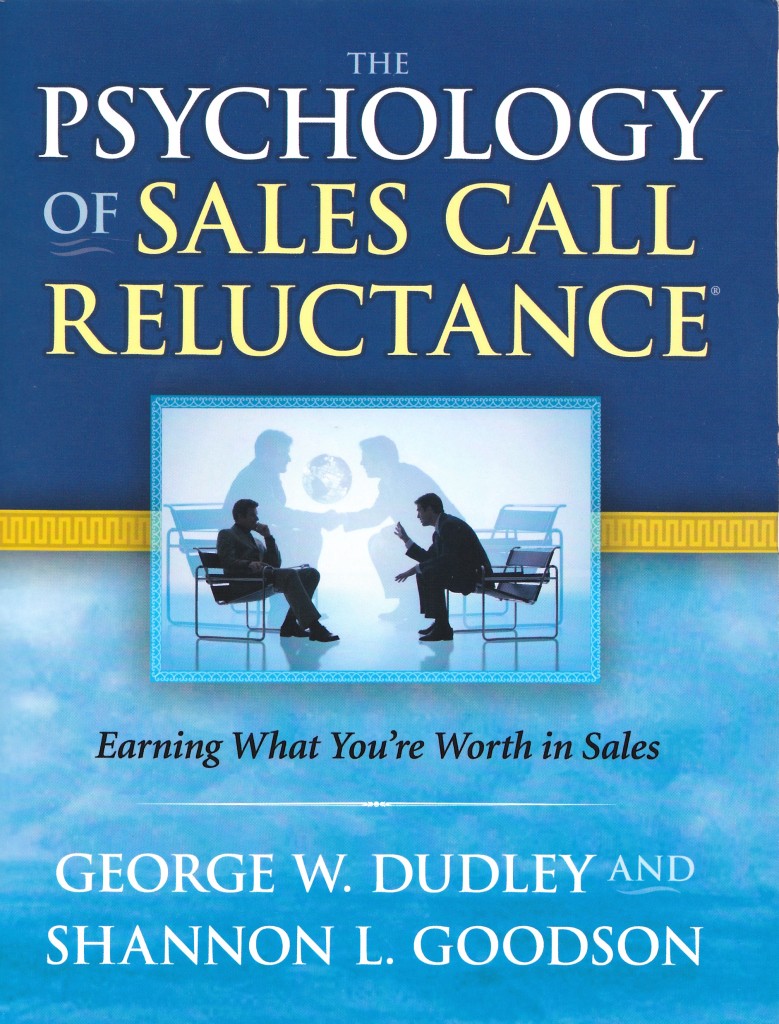 The Psychology of Sales Call Reluctance by George Dudley and Shannon Goodson is a critical and scientific look at a problem that plagues a lot of industries besides those with highly visible sales forces: Fear of Self Promotion. The Psychology of the Fear of Self Promotion–doesn’t ring quite the same.
The Psychology of Sales Call Reluctance by George Dudley and Shannon Goodson is a critical and scientific look at a problem that plagues a lot of industries besides those with highly visible sales forces: Fear of Self Promotion. The Psychology of the Fear of Self Promotion–doesn’t ring quite the same.
Dudley and Goodson have collected an excellent rebuttal to the over simplified solutions usually championed by sales trainers–“It’s just fear of rejection, or laziness”. But it’s not just… it’s more complicated than that. As almost anything dealing with human behavior is. The authors have plenty of snarky remarks for this brand of agitator.
Agitators. This is how the authors see the under-qualified coaching efforts of sales trainers who promote anecdotal solutions to problems with a lot of strings attached. Agitators can cause very expensive problems creating reluctant sales people where there were none to begin with.
Sales Call Reluctance is not just a fear of rejection. It doesn’t explain how the many people who are clearly not lazy, and have clearly shed their fear of rejection, can still manage to dramatically under-perform far worse than could be explained simply by bad luck. The authors explain that sales call reluctance can’t be present in someone who doesn’t want to excel in their sales career. In other words, someone who doesn’t want to self promote, doesn’t have a problem with a fear of self promoting.
The first three chapters of the book are focused on defining the problem and the scope and state of the solution.
The second chapter deals with what the authors refer to Sales Call Reluctance Imposters. The imposters are the reason the solution to the problem is so much less self-evident than it appears to be. Imposters express symptoms of one type of reluctance, while actually holding another one. The twelve types of Call Reluctance identified in the author’s research, and explained in the weighty chapter 3, are:
- Doomsayer; overly focused on the worst case scenario
- Over-Preparation; fixated on being prepared for every scenario
- Hyper-Pro; fixated on professional presentation
- Stage Fright; paralyzed by the group spotlight
- Roll Rejection; feelings of shame over self-promotion occupation
- Yielder; Obsession with courtesy
- Social Self-Consciousness; pre-occupation with relative status
- Separationist; Can’t sell to friends
- Emotionally Unemancipated; Can’t sell to family
- Referal aversion; Can’t ask for help
- Telephobia; fear response affixed to the phone and communication devices
- Oppositional Reflex; Always 5 excuses ahead of any criticism
The authors have conducted their research and tailored their treatment suggestions to work with their proprietary SPQ*Gold personality test, which has more than a few decades of use and refinement to boast some pretty reasonable credibility. But as the authors admit, it’s not the end all be all. They have much to learn, as all of us do. That been said, the book is effectively a very long sales pitch for the test. You’ll be interested in what your scores would look like before you’re done.
The second large section of the book is dedicated to considering the treatment suggestions that might be effective for the various kinds of call reluctance identified. The authors stress that users should pay careful attention to how and in what order treatments are applied, and not to try and apply them where they’re not suggested. It sounds ominous when they say it, but it doesn’t seem non-sensical as you read their advice.
I don’t want to go into specifics because I really think their suggestions are more than just a bag of tricks–and I haven’t followed enough of the suggestions myself to feel like I could say anything useful about them. But let’s just say this: I’m still wearing a rubber band around my wrist.
Overall, this book is readable. The authors interject wit just often enough to keep things moving along, but mind you, it’s not a lightweight book either. Each chapter cost me more than an hour. And there’s no ebook option. Blather!
As I finished the book, I found that it was directly relevant to me as a photographer and salesperson for my photography company. But it’s also fascinating as a support for the understanding of colleagues, and the challenges other businesses face. If you’re someone who relies heavily on self-promotion (artists, I’m looking at you), I think you’ll find a lot of helpful insights here. Sometimes just seeing and naming a problem is enough to make it start to wither away.

Recent Discussion